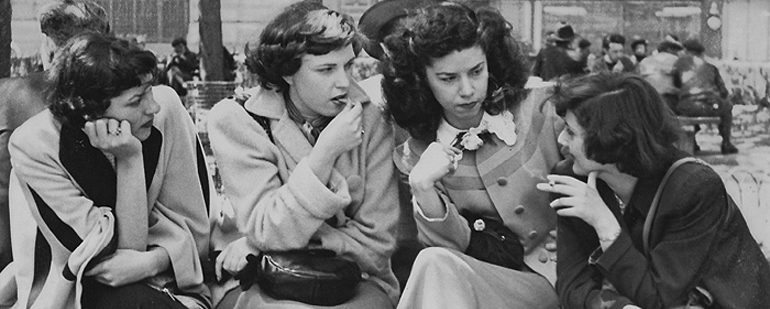What are Words For?

“That for which we find words is something already dead in our hearts. There is always a kind of contempt in the act of speaking.”
I’ve always bristled at Nietzsche’s many remarks on language. Here’s another:
“All words are prejudices.”
I get it: language is a substitute for the infinitely deep and inexpressibly rich vibrations of our experiences. Words are translation and in translation something is always lost. “Nowhere do they touch upon absolute truth,” Nietzsche insists.
But most of us don’t live in silence or solitude; civilization happened and we think, speak, converse, and write in words. Language isn’t fixed—we’re constantly honing and adjusting it to our changing needs. And while actual linguistic or language diversity has been in steep decline for decades—within a language, new relationships, new experiences, and new technologies compel or necessitate new words.
Since 1991 the American Dialect Society has chosen a “Word of the Year” at the end of each calendar year. Recently the celebrated words have reflected the U.S. social and political climate—in 2011 the word of the year was occupy, a verb or noun inspired from the Occupy movements of that year; in 2014 it was #blacklivesmatter, and in 2015 it was the singular they, as a gender-neutral pronoun, especially for non-binary gender identities.
At a residency recently I was talking with a poet friend about the minting of new terms, specifically new language needed to serve and address people and modes of existence previously unheard or underserved. We agreed that we’re far from where we need to be as an open, loving culture but we’re heading there. Most days it feels slow going, but it’s going. Social media platforms play a major role in the creation and exchange of new words and terms. As Twitter users (or, tweeple, tweeters, tweeps, et al.) know especially—every word counts. Every character matters.
To define and give form to things, phenomena, lifestyles, identities, and injustices is profound and validating. Words can confer dignity and affirmation to a person’s existence or suffering. We’re putting ideas into language, or is language being put to ideas? Old words take new shapes and partners, like transitioning and trigger warning. We now name things that weren’t before in the lexicon, words like intersectionality, cisgender, and heteronormativity. Queer is example of a word reclaimed from derogatory use/sense and can be used appropriately/positively.
Let’s look back even at the recent past of literature. Calliope Stephanides, the narrator of Jeffrey Eugenides’ Middlesex, explains her experience early in the novel:
“When this story goes out into the world, I may become the most famous hermaphrodite in history. There have been others before me… As far as the doctors are concerned, I’m even better than Gottlieb. To the extent that fetal hormones affect brain chemistry and histology, I’ve got a male brain. But I was raised as a girl.”
According to the Intersex Society of America, the term hermaphrodite implies that a person is both fully male and fully female, a physiologic impossibility. Hermaphrodite is a confusing and stigmatizing term, and like oriental, the term used to refer to people of Asian or Pacific heritage, it is outdated and mythological. Calliope might now refer to herself as intersex.
In her essay, “On Not Being a Victim,” for the March 1994 issue of Harper’s, Mary Gaitskill describes something we now call rape culture and victim-blaming:
“Camille Paglia, author of Sexual Personae, has stated repeatedly that any girl who goes alone into a frat house and proceeds to tank up is cruising for a gang bang, and if she doesn’t know that, well, then she’s ‘an idiot.’ The remark is most striking not for its crude unkindness but for its reductive solipsism.”
Neither victim-blaming nor patriarchal attitudes toward rape are new phenomena, but these new terms for old trends show an increased awareness and sensitivity to harmful patterns and aggressions.
Chimamanda Ngozi Adichie’s novel, Americanah, is full of descriptions of “brief and commonplace daily verbal, behavioral, or environmental indignities, whether intentional or unintentional, that communicate hostile, derogatory, or negative racial slights and insults toward people of color,” otherwise known as microaggressions. Dr. Chester Pierce first coined the term in the ‘70s, defined here in Columbia professor Derald Sue’s 2007 American Psychologist article.
While attending Yale University, Adichie’s protagonist, a young Nigerian woman named Ifemulu, nannies for a bleeding-heart, well-intentioned white liberal woman named Kimberly. Adichie doesn’t exactly name what Ifemulu experiences with her employer, but we know them today as racial microaggressions.
“’What a beautiful name,’ Kimberly said. ‘Does it mean anything? I love multicultural names because they have such wonderful meanings, from wonderful rich cultures.’ Kimberly was smiling the kindly smile of people who thought ‘culture’ the unfamiliar colorful reserve of colorful people, a word that always had to be qualified with ‘rich.’ She would not think Norway had a ‘rich culture.”
Ifemulu would come to realize later that Kimberly used “beautiful” in a peculiar way. “’I’m meeting my beautiful friend from graduate school,’ Kimberly would say, or ‘We’re working with this beautiful woman on the inner-city project,’ and always, the women she referred to would turn out to be quite ordinary-looking, but always black.”
At a dinner party thrown by her employer, Ifemulu endures more of these seemingly banal/trivial but pervasive assaults.
“’You’re so beautiful,’ a man told her, smiling, his teeth jarringly white. ‘African women are so gorgeous, especially Ethiopians.’ A couple spoke about their safari in Tanzania. ‘We had a wonderful tour guide and now we’re paying for his first daughter’s education.’ Two women spoke about their donations to a wonderful charity in Malawi that built wells, a wonderful orphanage in Botswana, a wonderful microfinance cooperative in Kenya. Ifemulu gazed at them.”
Rather than outright discrimination, people of color instead experience these more subtle social cues that hint at biased tendencies. On the same spectrum of modern day racism is color–blindness, what Professor Eduardo Bonilla-Silva refers to as the modern trend of individuals and communities acting as though they cannot “see” race. Zadie Smith turns color–blindness on its head in her novel NW. Many of her characters, a group mostly born and bred in London, are people of color, but Smith made the conscious decision to not talk about the color of anyone’s skin.
“In novels where the characters are white,” she said in a radio interview described in The Independent, “nobody thinks the race is being obscured. They just don’t think the races exist, because of this idea of neutrality when it comes to white characters. It is,” she said, “very difficult to find a way to get people out of that mindset, so that they can see that people of colour are not strange or exotic in themselves, or to themselves.”
Instead of describing skin color—which is mentioned in NW only when it’s white—Smith uses Cockney and Caribbean patois slang along with rhythms of speech to signal race and class.
“I remember as a kid,” she said, “reading Updike or Roth, writers I loved, but half way through the book you’d have to deal with the appearance of ‘the black man’, who would be described as ‘the black man’. That can be quite exhausting to read, so I wanted to see if I could create that exhaustion the other way round.”
Exhaustion, in fact, is a common gripe of those adverse to political correctness. “It’s just a word,” goes the complaint. “What’s the big deal?”
Especially when it comes to identity politics, the minting of new terms help make a society feel more inclusive and less hateful to those who are different—that’s the big deal, even if those same terms inevitably serve forms of exclusivity and prescription. What we choose to name and not name speaks to our willingness to acknowledge and give voice to differences. We all belong to something even if we don’t see ourselves reflected or expressed in the world around us.
As of now, some new words still fall short. We’re not yet at a point where there are words for every experience. But if we named every single thing, what would happen to nuance and imagination? Maybe, hopefully—Nietzsche was right. Life is far too complex.



